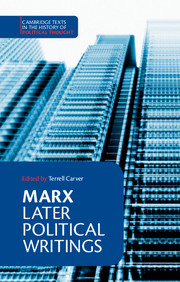Book contents
- Frontmatter
- Contents
- Acknowledgements
- Editor's introduction
- Chronology of Marx's Life and Career, 1848–1883
- Bibliography
- Editor's note on texts and translations
- Glossary of major historical figures
- Manifesto of the Communist Party (with Friedrich Engels)
- The Eighteenth Brumaire of Louis Bonaparte
- ‘Introduction’ to the Grundrisse
- ‘Preface’ to A Contribution to the Critique of Political Economy
- The Civil War in France
- Critique of the Gotha Programme
- ‘Notes’ on Adolph Wagner
- Index
- Cambridge Texts in the History of Political Thought
Critique of the Gotha Programme
Published online by Cambridge University Press: 05 June 2012
- Frontmatter
- Contents
- Acknowledgements
- Editor's introduction
- Chronology of Marx's Life and Career, 1848–1883
- Bibliography
- Editor's note on texts and translations
- Glossary of major historical figures
- Manifesto of the Communist Party (with Friedrich Engels)
- The Eighteenth Brumaire of Louis Bonaparte
- ‘Introduction’ to the Grundrisse
- ‘Preface’ to A Contribution to the Critique of Political Economy
- The Civil War in France
- Critique of the Gotha Programme
- ‘Notes’ on Adolph Wagner
- Index
- Cambridge Texts in the History of Political Thought
Summary
(1) ‘Labour is the source of all wealth and culture, and since it is only possible to have useful labour in and through society, all members of society have an equal right to the undiminished return from labour.’ First part of the paragraph: ‘Labour is the source of all wealth and all culture.’
Labour is not the source of all wealth. Nature is just as much the source of use-values (and what else is material wealth?) as labour, which is itself only the expression of a natural power, human labour power.
This line can be found in any children's primer and is correct in so far as the implication is that labour requires certain means and materials. However a socialist programme cannot allow a bourgeois phrase like this to conceal the very circumstances that give it some sense. Only in so far as man acts as the proprietor of nature, the primary source of all the means and materials of labour, and treats nature as his own from the outset, does his labour become the source of use values, and hence of wealth. The bourgeoisie have very good reason to credit labour with a supernatural generative power; for it follows directly from the fact that nature is a precondition for labour, that a man who has no property other than his labour power must in all cultural and social circumstances be a slave to those who have become the owners of labour's material prerequisites.
- Type
- Chapter
- Information
- Marx: Later Political Writings , pp. 208 - 226Publisher: Cambridge University PressPrint publication year: 1996
- 19
- Cited by



